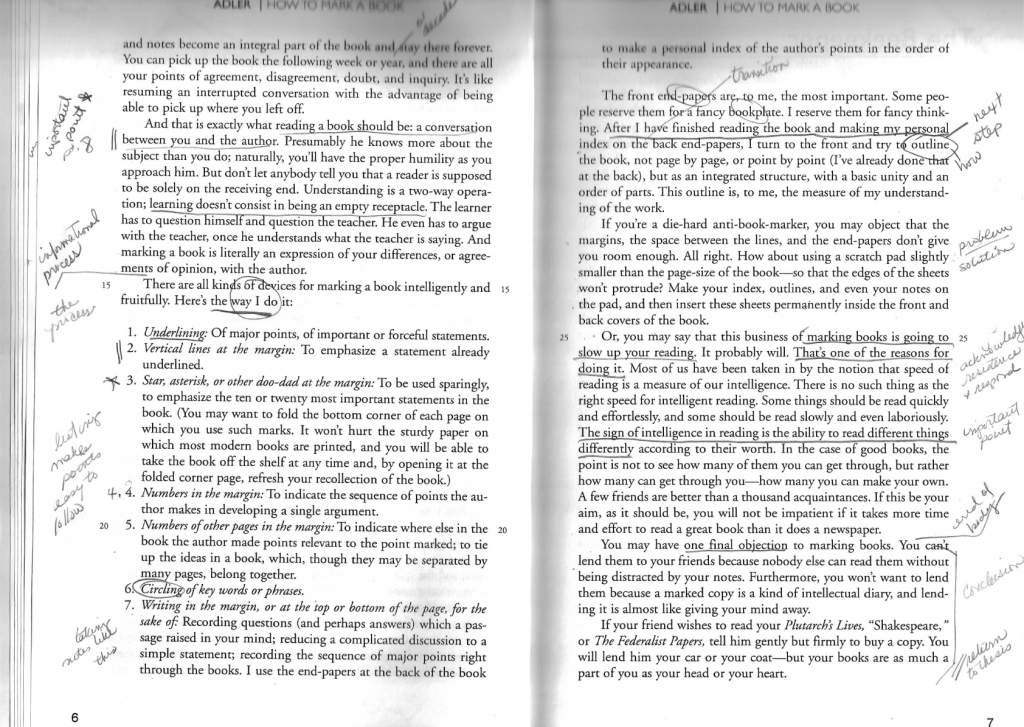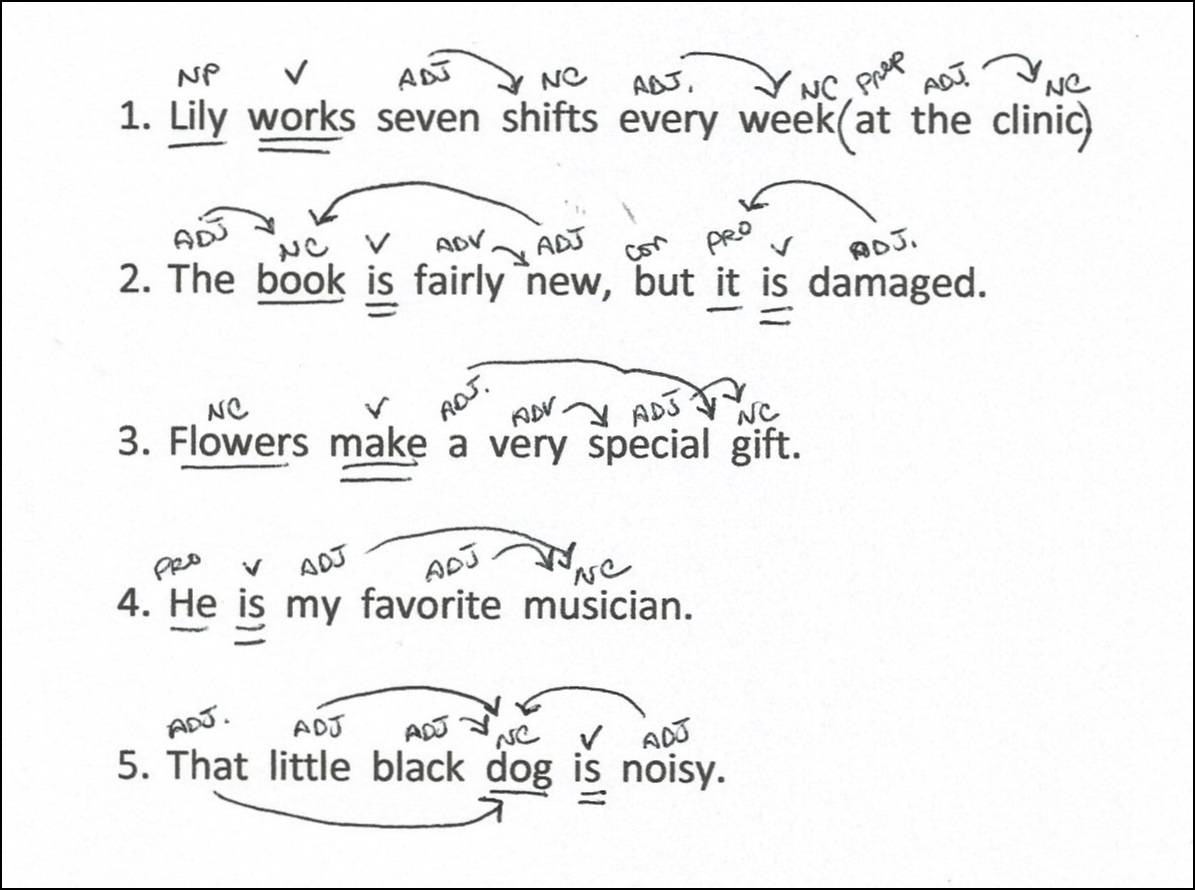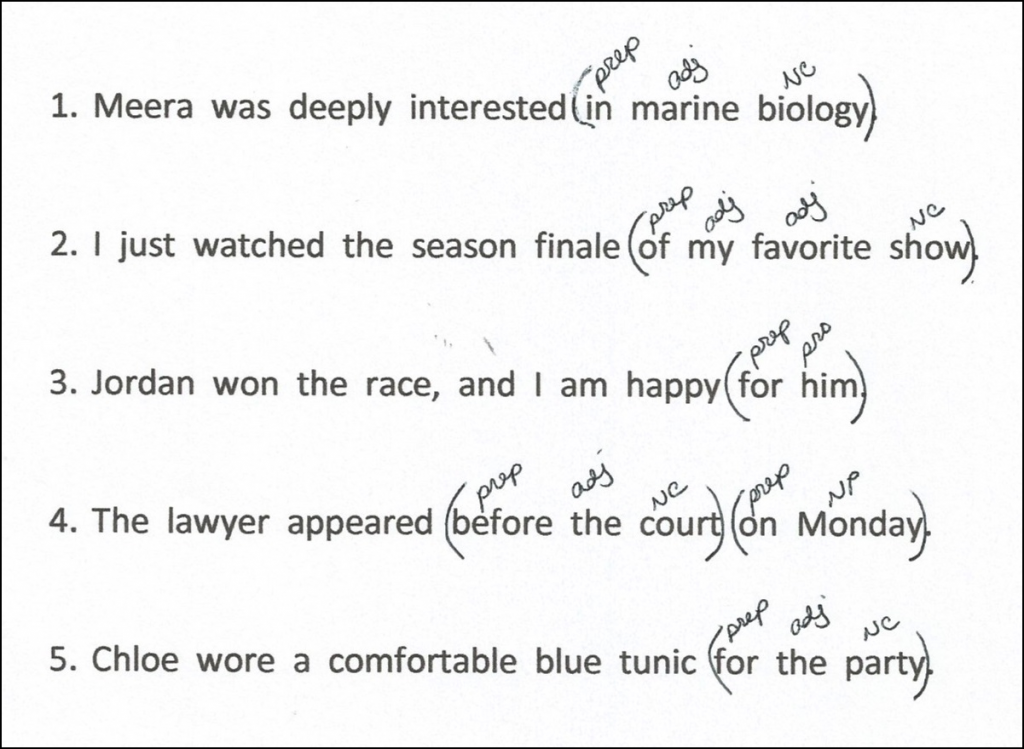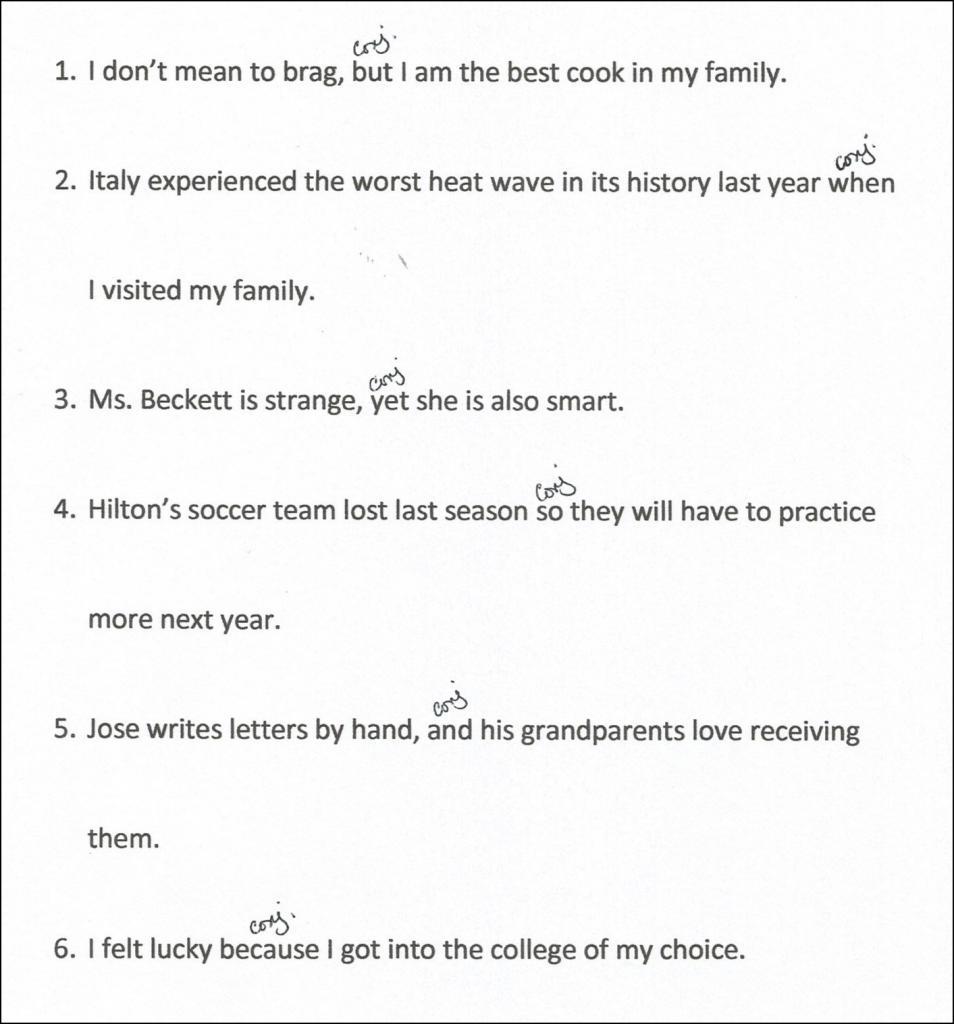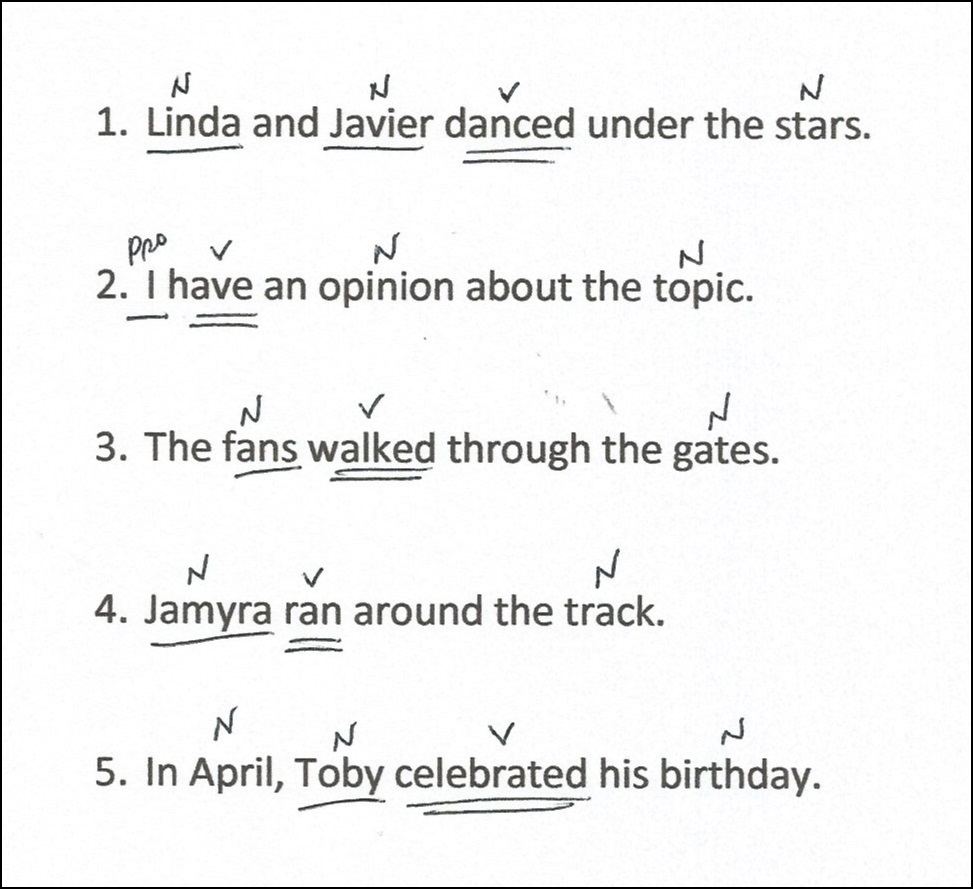8.1 Answers to Exercises
Preview
This chapter includes answers to the exercises that have right or wrong answers. Once you have completed an exercise, check your answers here. If you made a mistake, see if you can figure out why. If you can’t figure it out, ask the instructor or a tutor to explain. If you got the exercise correct, good job!
This section does not include answers to exercises that are based on your personal experience, like those in Ch. 1, because those answers will differ from student to student. It also does not include exercises that are steps in a writing assignment, like those in Ch. 6, because your answers will differ from those of other students.
Ch. 1.1
Ex. 2
You were asked to print out and read the essay “How to Mark a Book” by Mortimer Adler. Then, use the process Adler explains to mark his essay up as you read it a second time. Your marked up essay should look something like this:
Ch. 2.1
Ex. 1
The nine misspelled words in the paragraphs about Alexie are as follows (the correct spelling is in parentheses):
likly (likely)
disabilitys (disabilities)
plagud (plagued)
aleinated (alienated)
socializeing (socializing)
displaid (displayed)
anthologeis (anthologies)
noteably (notably)
storys (stories)
Ch. 2.2
Ex. 1
The correct word is in red.
- The news predicts good weather for our trip.
- My little cousin turns two years old tomorrow.
- The next-door neighbor’s dog is quite loud. He barks constantly.
- Your mother called this morning to talk about the party.
- I like to wear unique clothing from thrift stores with no company logos.
- I would rather eat a slice of chocolate cake than eat a chocolate muffin.
- Everyone goes through hardships in life.
- I don’t care who’s coming to the party.
- Do you have any loose change to pay the parking meter?
- Father must have left his briefcase at the office.
- Marjorie felt like she was being led on a wild goose chase, and she did not like it one bit.
- Before playing ice hockey, I was supposed to read the contract, but I only skimmed it, which may affect my understanding.
- The party they’re hosting will be in June at their ranch.
- Except for Ajay, we all had tickets to the game.
- It must be fall, because it’s getting darker earlier.
Ex. 2
The slang words that should be changed are “airhead,” “bombed,” “going off,” “wow,” “boo,” and “guts.”
Ex. 3
The clichés that need replacing are “ax to grind,” “wit’s end,” “bottom line,” “make ends meet,” “my brain is fried,” “pulling an all-nighter,” and “tongue tied.”
Ch. 2.3
Ex. 1
The proper nouns in these sentences are as follows:
- Catholic, Church of England
- Dad, Mom
- none
- Aquarius
- none
The common nouns in these sentences are as follows:
- sister
- gifts, toaster, blender, bathrobe
- telephone, indicators, types, messages
- astrology, sign
- wind, night, house
Ex. 2
The correct pronouns are in red. The antecedent is identified in the parentheses that follows.
- In the current economy, workers don’t want to waste their money. (The antecedent of “their” is “workers.”)
- If my sister goes to medical school, she must be prepared for the long hours. (The antecedent of “she” is “sister.”)
- The plumbing crew did their best to repair the broken pipes. (The antecedent of “their” is “crew.”)
- The commencement speaker said students have an opportunity to improve their lives. (The antecedent of “their” is “students.”)
- Aunt Norma was a talented gardener and she worked in the yard nearly every day. (The antecedent of “she” is “Aunt Norma.”)
- My computer is nearly ten years old. It really needs to be replaced. (The antecedent of “It” is “computer.”)
Ex. 3
The pronoun errors are crossed out and any necessary changes are inserted in red.
- The eighth grade students
theywere behaving mysteriously. - Twyla and
meI went to the circus on Friday. - The instructor gave her notes to Marilyn
her notes. - Juan is a man
thatwho has high standards. A gardener isGardeners are only successful ifhe or she hasthey have good soil.
Ex. 4
The correct verb form is in red.
- The Dust Bowl was a name given to a period of destructive dust storms in the United States during the 1930s.
- Today, historians consider The Dust Bowl to be one of the worst weather events in American history.
- The Dust Bowl mostly affected Kansas, Colorado, Oklahoma, Texas, and New Mexico.
- Dust storms continue to occur in these dry regions, but not to the devastating degree of the 1930s.
- The Dust Bowl era finally came to end in 1939 when the rains arrived.
Ch. 2.4
Ex. 1 & Ex. 2
In Ex. 1, you labeled the common and proper nouns and the pronouns. Then you identified any adjectives that modified those nouns or pronouns and drew an arrow from the adjective to the word it modified.
In Ex. 2, you identified which words were verbs. Then, you found any adverbs that modified verbs, adjectives or other adverbs and drew an arrow from the modifier to the word modified.
(I have labeled conjunctions and prepositions and enclosed prepositional phrases in parentheses, for your information; that was not required on the assignment.)
Ex. 3
In this exercise, you identified prepositional phrases by enclosing them in parentheses. Then you labeled the words in the prepositional phrase: the preposition, the nouns or pronouns, and any adjectives or adverbs.
Ex. 4
This exercise asked you to find and label any conjunctions.
Ch. 3.1
Ex. 1
You labeled all the nouns or pronouns in the sentence. Then, you decided which nouns or pronouns were the sentence subject and underlined subjects once. Finally, you identified what the subject was doing the sentence (the verb) and underlined verbs twice.
Ex. 2
Complete sentences are marked. Fragments have missing information explained. Corrections will vary from student to student.
- The band arrived in a limo with their guitars in the trunk. Complete.
- Entered the classroom and took off his backpack. Missing a subject. Who entered the classroom?
- Taking a family cruise to Puerto Vallarta. Missing a subject. Who is taking the cruise?
- A kite in the shape of an eagle. Missing a verb. What is the kite doing?
- In the park last night, I saw a bat. Complete.
- Bentley, the next door neighbor, likes. This has a subject and a verb, but it doesn’t have a complete thought. What does Bentley like?
- Blew down in the high wind, but the maple tree was unharmed. Missing a subject. What blew down?
Ch. 3.2
Ex. 1
Corrections to subject-verb agreement errors are in red.
- My dog and cat
chaseschase each other in the house. - The books in my library
isare the best I have ever read. - There
isare the newspapers I was supposed to deliver. - Some of the clothes
isare packed away in the attic. - Crows in my white maple tree and on the electrical line
isare annoying.
Ex. 2
Misplaced modifiers have been corrected in red.
- The young lady on the telephone was walking the dog
on the telephone. - I heard on the evening news there was a robbery
on the evening news. Rolling down the mountain,the explorer stopped the rock rolling down the mountain with his foot.- We are looking for a babysitter who doesn’t smoke and owns a car for our six-year-old
who doesn’t smoke and owns a car. - The teacher served cookies wrapped in aluminum foil to the children
wrapped in aluminum foil. - Driving home from work, Charlie spotted a stray puppy
driving home from work.
Ex. 3
There are several ways to correct the dangling modifiers in these sentences. The answers presented are one option.
Playing a guitar in the bedroom, the cat was seen under the bed.While playing a guitar in the bedroom, I saw a cat under the bed.Packing for a trip, a cockroach scurried down the hallway.As Marnie was packing for a trip, she saw a cockroach scurry down the hallway.
While driving to the veterinarian’s office, the dog nervously whined.The dog nervously whined as he was being driven to the veterinarian’s office.Piled up next to the bookshelf, I chose a romance novel.From the books piled next to the shelf, I chose a romance novel.Chewing furiously, the gum fell out of my mouth.The gum fell out of my mouth as I chewed furiously.
Ex. 4
There are several ways to correct the parallel structure in the following sentences. These answers present one option.
I would rather work at a second job to pay for a new car than a loan.I would rather work at a second job to pay for a new car than take out a loan.How you look in the workplace is just as important as your behavior.How you look in the workplace is just as important as how you behave.Indian cuisine is tastier than the food of Great Britain.The food of India is tastier than the food of Great Britain.Jim’s opponent in the ring was taller, carried more weight, and not as strong. Jim’s opponent in the ring was taller and heavier but weaker.Working for a living is much harder than school.Working for a living is much harder than going to school.
Ch. 4.1
Ex. 1
End punctuation is added in red.
- Valivann brought pulled pork, salad rolls, and rice to the picnic.
- Will John be on time?
- Chris always says John has his own clock.
- I still have to clean and move the table and chairs that have been sitting in the basement since last summer.
- Rain! On my birthday! Such bad luck!
- The good news is we can still eat cake, even in the rain.
Ch. 4.2
Ex. 1
Commas and conjunctions have been added to these sentences. Some words have been changed where necessary.
- John wanted a snack before bedtime, so he ate some fruit.
- We could go camping for vacation, or we could go to the beach
for vacation. - I want to get a better job, so I want to finish college.
- I cannot move forward on this project, but I cannot afford to stop
on this project. - The weather was clear yesterday, and we decided to go on a picnic. (The conjuction “so” would also work here.)
Ex. 2
Commas have been added in red where necessary. If a sentence was correct, it has been marked as such.
- The letter was postmarked May 4, 2001, but I didn’t receive it until June.
- He visited Italy in July 2009. correct
- We looked at the dark, dangerous sky and wondered if we would make it home safely.
- I recently moved to 4542 Larkspur Lane, Hope, Missouri 70832.
- Eric lives in Boston, Massachusetts, and uses public transportation.
Ex. 3
Commas have been added in red.
- In the blink of an eye, the kids were ready to go to the movies.
- Confused, he tried opening the box from the other end.
- I prefer ice cream to vegetables, don’t you?
- Without a doubt, green is my favorite color.
- The best dogs are loyal and sweet, not just beautiful.
Ex. 4
Commas have been added in red. At the end of each sentence, the number of the rule is listed.
- Our meeting is scheduled for Thursday, March 20. (Rule 2) Before that time, we need to gather all our documents. (Rule 3) To prepare for this meeting, please print any e-mails, faxes, or documents referred to in your report. (Rule 3, then Rule 2)
- The leader of the group, Garth, kept checking their GPS location. (Rule 7) Isabelle, Raoul, and Maggie carried the equipment. (Rule 2) As a result, no one noticed the darkening sky until the first drops of rain. (Rule 3)
- Please have your application submitted by April 15, 2020. (Rule 2) In your cover letter, include contact information the position you are applying for and two references. (Rule 3) We will not be available for consultation after April 10, but you may contact the office before then. (Rule 1)
Ch. 4.3
Exercise 1
Apostrophes have been added in red.
- Colin was a hippie in the ’60s.
- My brother’s wife is one of my best friends.
- It’s my parents’ house, but it’s my bedroom.
- I couldn’t believe that I got the job!
- My supervisors informed me that I wouldn’t be able to take the day off.
- Won’t you please join me for dinner tonight?
- Sarah’s job just disappeared due to the pandemic.
- Texas’s state flower is a bluebonnet, not a yellow rose.
Ch. 4.4
Ex. 1
Quotation marks have been added in red. Notice whether they appear before or after other punctuation. Correct sentences are marked “Correct.”
- Yasmin said, “Let’s go out to eat.”
- “Where should we go?” asked Russell.
- Yasmin said it didn’t matter to her. Correct.
- “I know, let’s go to the Two Roads Juice Bar. Did you know that the name is a reference to a poem?” asked Russell.
- Yasmin was surprised and asked the poem’s title. Correct.
- “‘The Road Not Taken’ by Robert Frost,” Russell explained.
- “Oh!” said Yasmin, “Is that the one that starts with the line, ‘Two roads diverged in a yellow wood’?”
- Russell nodded in agreement. Correct.
Ex. 2
The following are correctly italicized or enclosed in quotation marks.
- Queen Mary 2
- The Washington Post
- BBC News
- Breaking Bad
- “On the Road Again” by Willie Nelson
- “The Yellow Wallpaper” by Charlotte Perkins Gilman
- The New Yorker
- “The Raven” by Edgar Allen Poe
- aloha
- Bigger Love or “Bigger Love” by John Legend (This one is tricky because “Bigger Love” is a song on the album Bigger Love)
- Overcooked
- Macbeth by William Shakespeare
- Netflix
- I Know Why the Caged Bird Sings by Maya Angelou
Ch. 4.5
Ex. 1
Capital letters have been corrected in red. Notice that some errors are missing capitals and other errors are capitals that should be lower case.
David Grann’s The Lost City of Z mimics the snake-like winding of the Amazon River. The three distinct stories that are introduced are like twists in the river. First, the author describes his own journey to the Amazon in the present day, which is contrasted by an account of Percy Fawcett’s voyage in 1925 and a depiction of James Lynch’s expedition in 1996. Where does the river lead these explorers? The answer is one that both the author and the reader are hungry to discover.
The first lines of the preface pull the reader in immediately because we know the author, David Grann, is lost in the Amazon. It is a compelling beginning not only because it’s thrilling but also because this is a true account of Grann’s experience. Grann has dropped the reader smack in the middle of his conflict by admitting the recklessness of his decision to come to this place.
The suspense is further perpetuated by his unnerving observation that he always considered himself a neutral witness, never getting personally involved in his stories, a notion that is swiftly contradicted in the opening pages, as the reader can clearly perceive that he is in a dire predicament–and frighteningly involved.
a word the pronoun refers to

